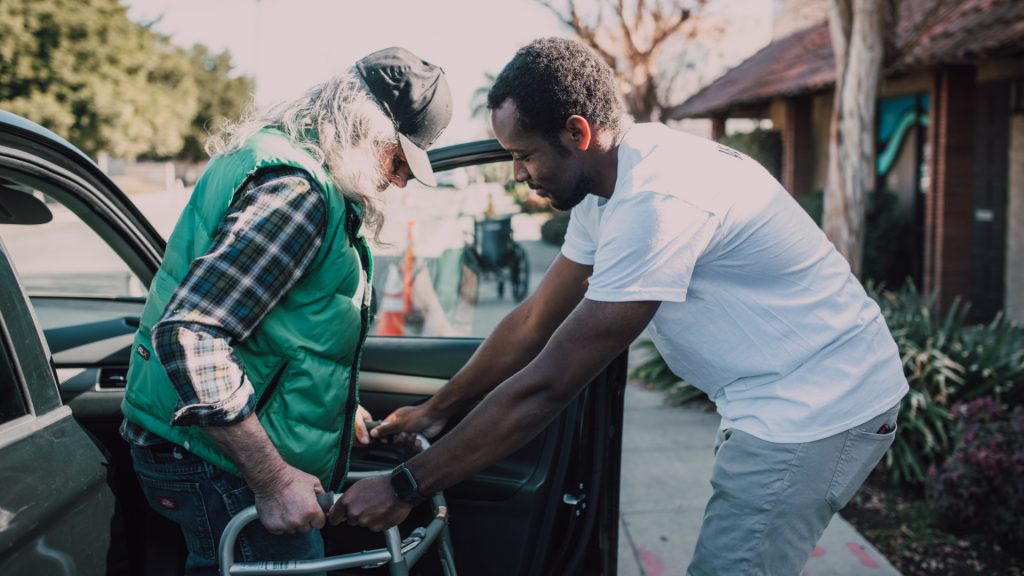The Gospels
The Unfilled Seat
Read This Week: Mark 11
When they brought the colt to Jesus and threw their cloaks over it, he sat on it. Many people spread their cloaks on the road, while others spread branches they had cut in the fields. Those who went ahead and those who followed shouted, “Hosanna!” “Blessed is he who comes in the name of the Lord!” “Blessed is the coming kingdom of our father David!” “Hosanna in the highest heaven!” – Mark 11:7-10 NIV
Jesus Christ is unique. He is unique in all of eternity and human history. When Christ was on earth, his uniqueness was most seen in the hypostatic union of His humanity and divinity coming together in one individual existence. Out of this supernatural reality came another tenant of what made Jesus unique – His claim to be God. The author Thomas Schultz once wrote:
Not one recognized religious leader, not Moses, Paul, Buddha, Mohammed, Confucius, etc., has ever claimed to be God, that is, except for Jesus Christ. Christ is the only leader who has ever claimed to be a deity and the only individual who has ever convinced so many in the world that He is God.
This distinction that makes Jesus stand out among all the rest is also why He was the only one who could ride on that donkey into Jerusalem that day. He was the fulfillment of its prophecy, the Messiah for whom they had been looking. Jesus was the answer for everything, and that was His rightful seat of honor. He was the only one who could fill the unfilled seat. No one else had the power, authority, divinity, and eternal existence for the people to shout the things they did in verses 9-10:
Hosanna! Blessed is he who comes in the name of the Lord! Blessed is the coming kingdom of our father, David! Hosanna in the highest heaven!
These were the distinctions reserved for Jesus. He is the only one who claimed to be God, holds equality with God, raised the dead, forgave sins, died an atoning death, and rose from the dead. He is also the only one who said He is coming back for us. The person of Christ should always sit in that seat of honor.
He still deserves that place in the world and our hearts today. Often, just like the crowds that day who would later call for Him to be crucified, the root of our sin comes from trying to fill the seat Jesus alone can fill. We want to crown another and give them the throne of our lives instead of the one who rightly deserves it. We want to give the seat to a friend, a spouse, a job, a position, money, influence, and even ourselves. But none of these are worthy to sit there above all the others.
Jesus should be the occupant of the unfilled seat in our hearts first and foremost and therefore remain in control of our relationships, families, work, and activities. May we spread our coats on the road of our lives in front of Him. May we cut palm branches to wave in His honor as we shout, Hosanna (Save Us), and quote Scripture in our darkest and brightest moments. May we recognize Christ as supreme and yield to His authority to sit in the unfilled seat for all of our days and not just when we feel like celebrating Him.
Lead by Serving
Read This Week: Mark 10
Jesus called them together and said, “You know that those who are regarded as rulers of the Gentiles lord it over them, and their high officials exercise authority over them. Not so with you. Instead, whoever wants to become great among you must be your servant, and whoever wants to be first must be slave of all. For even the Son of Man did not come to be served, but to serve.” – Mark 10:42-45 NIV
The Christian pastor and author Henry Blackaby once wrote, “Spiritual leadership is effectively leading others on to God’s agenda and purpose.” Spiritual leadership aims to serve God and others. The point of spiritually leading people is to serve them by guiding their lives to the Lord and His will. Jesus put it like this in the second part of verse 43: whoever wants to become great among you must be your servant.
It is obvious in this section of Mark 10 that God wants us to be different than the world when it comes to leadership and our approach to people. Jesus explicitly says this in verses 42-43:
Those who are regarded as rulers of the Gentiles lord it over them, and their high officials exercise authority over them. Not so with you.
His desire for us as His followers and disciples is not to be leaders by worldly standards but spiritual leaders that reflect the heart of God and serve other people and the Gospel mission. Natural leaders are self-confident but spiritual leaders are confident in God. A natural leader makes their own decisions, while a spiritual leader seeks God’s will in those decisions. A natural leader is ambitious only, but a spiritual leader is humble in their pursuits. Natural leaders create methods, enjoy power, seek rewards, and flaunt their independence. A spiritual leader follows the Holy Spirit, delights in obedience, loves Jesus and people, and values dependence on God.
Jesus states the way the world leads and deals with others should not be so with followers of Christ. The difference lies in who is leading us. The filling of the Holy Spirit is the essential catalyst to spiritual leadership. Nothing is more awkward, futile, and destructive than a person trying to lead spiritually without being led by the Spirit themselves. The natural leader can lead and perform tasks in the church and world but cannot serve Jesus and people in a way that honors God and is of eternal value.
Our encouragement from the Scriptures is to lead and serve like Jesus. Verse 45 reminds us that He is the ultimate example of servant leadership and the bar of excellence in how we should conduct ourselves on mission. He said even the Son of Man did not come to be served, but to serve, and to give his life as a ransom for many. This standard of leadership was good enough for Christ, and it is certainly good enough for us.
No Distraction
Read This Week: Mark 9
“If anyone causes one of these little ones—those who believe in me—to stumble, it would be better for them if a large millstone were hung around their neck and they were thrown into the sea. If your hand causes you to stumble, cut it off. And if your eye causes you to stumble, pluck it out. – Mark 9:42-50 NIV
As of 2021, the United States ranked 3rd in the world with over 313 million active internet users nationwide. Over 90 percent of Americans have access to the internet, with many responding that they could not imagine a life without it. Additionally, 296 million people in this country use social media, and 82 percent of those individuals use it mostly on their mobile phones. Mobile platforms and devices consist of over 50 percent of internet access. All of this does not account for TV viewing, time spent at work and school absorbing information, participating in extracurricular activities, and interacting with family, friends, and co-workers.
We are bombarded with information, data, and distractions to last a lifetime. There is so much white noise and obstacles to clear thinking, mindfulness, and concentrating on things that will enrich and transform our lives. It takes a tremendous and concerted effort to stay focused on what matters and stay consistent in pursuing God and an intimate relationship with Christ. We have enough to contend with and do not need additional barriers to hear the Gospel, absorb the truth, be encouraged, and continue serving the Lord.
This idea of being a stumbling block to others is what Jesus addresses at the end of Mark 9. He just finished teaching that anyone who gives a cup of water in my name belongs to the Messiah (v.41), and He is intent on instructing believers to be sure they are not preventing others from knowing and following Him even in the little things that we may take for granted. Jesus says in verse 42:
If anyone causes one of these little ones—those who believe in me—to stumble, it would be better for them if a large millstone were hung around their neck and they were thrown into the sea.
These little ones referred to in this passage are all God’s children and those who follow Christ. This teaching is a sobering and direct challenge to the danger of causing others to stumble relationally, stop serving God, or walk away from faith altogether with our words, actions, and behaviors.
The way we conduct ourselves and treat others in the family of God and the world is essential to a life that honors Jesus and makes a positive impact. When we have pervasive sin issues in our lives, do not get along with each other, and are at enmity with people, it can be an unnecessary distraction to truth and a stumbling block that impedes the path to salvation.
Jesus is pointed in his message to us that whatever may be in our hearts and lives that cause us to stumble and therefore causes others to stumble must be taken out and removed. We must deal with these things drastically so that our lives are not on the list of hurdles, diversions, and confusing elements that keep people from the Good News of Christ and from being built up and edified in the Spirit.
Serious matters like being a stumbling block require serious measures to prevent and change it in our own hearts first and then in the Christian community as a whole. We should constantly examine ourselves to make sure we are not a distraction to the purposes God has for our lives, for His church, and for those He loves that are far from Him. As Jesus taught us here, we should be committed to doing whatever it takes to remove things that will take away from His glory and harm His mission.
Total Recall
Read This Week: Mark 8
During those days another large crowd gathered. Since they had nothing to eat, Jesus called his disciples to him and said, “I have compassion for these people; they have already been with me three days and have nothing to eat. If I send them home hungry, they will collapse on the way, because some of them have come from a long distance.” – Mark 8:1-3 NIV
Total recall is defined as the ability to recall images, sounds, or objects in memory with extreme precision. Total recall is also known as Eidetic Memory, which is recalling an image from memory with high accuracy for a time after seeing it only once. Eidetic is from the Greek word eidos, meaning seen. It would be easy for us to glance at the events of Mark 8:1-10 and think that we had seen this before, that it is a total recall of something we had just read. Our eidetic memory kicks in and tells us that the story and miracle in Mark 8 is the same one we just studied in Mark 6:30-44. But it is not the same.
Those who will try to find inconsistencies and contradictions in the Bible often get tripped up by the events of Mark 8:1-10 with the feeding of the five thousand. But it is not the same story with seeming discrepancies as to the narrative in Mark 6:30-44 as they are two different accounts. Take note of the differences below:
Mark 6:30-44
Bethsaida
Mostly Jews
5 Loaves & 2 Fish
5,000 People
1 Day
12 Baskets Left
Small Baskets
Mark 8:1-10
Decapolis
Mostly Gentiles
7 Loaves & Few Fish
4,000 People
3 Days
7 Baskets Left
Large Hampers
Notice that they take place in two different settings, in front of two different crowds and cultures, with distinct circumstances, needs, and timeframes. What remains consistent in both accounts and is a total recall of the previous story, is the compassion of Jesus for the people and his exercise of eternal power to do a miracle on their behalf. The authority, actions, and outcome of what the Savior accomplishes is a total recall.
However, the disciples did not have total recall of what Jesus had previously done. Their memories were short when it came to His miracle-working power. Even after they had witnessed the feeding of the five thousand, they forgot that the Lord could do the same thing again. When they had the perfect opportunity to remember and apply faith, they responded with doubt and unbelief in this question: But where in this remote place can anyone get enough bread to feed them?
Although the disciples’ reaction is disappointing and frustrating, it is difficult to be hard on them. We have some of the same tendencies in our life with God. We often forget His mercies and goodness of the past and fail to apply them to current situations. We can disregard the miracles He has done when remembering His grace and provision would fill us with faith and joy.
We need better and more precise recollection in our spiritual walks. We need to be aware of what we’ve seen before from the Lord and implement it regularly in our actions, devotion, and our witness before the world. We need total recall that Jesus Christ never changes. He remains the same and has the solution to every problem no matter the situation. We need spiritual eidetic memories so we can be confident in, trust, and obey God while experiencing the new miracles and success that He alone brings.
No Lip Service
Read This Week: Mark 7
So the Pharisees and teachers of the law asked Jesus, “Why don’t your disciples live according to the tradition of the elders instead of eating their food with defiled hands?” He replied, “Isaiah was right when he prophesied about you hypocrites; as it is written: “‘These people honor me with their lips, but their hearts are far from me. They worship me in vain; their teachings are merely human rules.’ You have let go of the commands of God and are holding on to human traditions.” – Mark 7:5-8 NIV
No one among us has ever not been guilty of our words being more prominent about something than our actions. No one is immune to talking more about what we are going to do than actually doing it. There is not a person on the planet earth, no matter how pure or well-meaning they are, that has not put a greater emphasis on what they say or think than they do their initiative and application. This practice is especially true in our life with God and our service to Him. We have all been guilty of paying lip service to our worship and spiritual walk or making insincere declarations that we supposedly believe or value.
But just because we are prone to lip service instead of action in our walks does not mean we should not try to live differently. We should call upon the Holy Spirit and immerse ourselves in the word of God to be doers and not merely talkers. We should ask God to help us daily to put away our pride and self-reliance and submit to His will of genuine worship. This posture and attitude are what Jesus was admonishing the Pharisees for in Mark 7. He told them that they were hypocrites and cared more about tradition and paying lip service to their religious rules than worshipping and serving the Lord. Verses 6-7 says:
These people honor me with their lips, but their hearts are far from me. They worship me in vain; their teachings are merely human rules.
Jesus communicated to them and us that you can check all the boxes in your religion, talk a big game about ceremony and tradition, and still not have a genuine relationship with God. The Pharisees thought they were holy because they followed the law and avoided violating religious rules. But Christ taught that a person who talks about and seems to obey all the regulations can still not be a genuine follower.
We face the same dilemma and conflict between man’s tradition and God’s truth. We must rely upon the power of the Spirit to value the living Word of God more than our religious heritage and man-made constructs that do not hold power. We have to be aware and vigilant that our thinking and ideas about worship, devotion, and the body of Christ do not supersede eternal truth. Jesus told them in verse 8:
You have let go of the commands of God and are holding on to human traditions.
The outward appearances of holiness and the rhetoric of spirituality can have little connection to the inner person. If our hearts are not sincere and devoted to Jesus, we are simply talking about a life with God instead of being about it. If we pursue the heart of the Savior regularly and His purposes, then our lives will be actionable and sustainable instead of simply being lip service to our faith. The world will observe what is on the outside, see the evidence of what is on the inside, and be drawn to its authenticity.
Mission: Possible
Read This Week: Mark 6
Calling the Twelve to him, he began to send them out two by two and gave them authority over impure spirits. These were his instructions: “Take nothing for the journey except a staff—no bread, no bag, no money in your belts. Wear sandals but not an extra shirt. Whenever you enter a house, stay there until you leave that town. And if any place will not welcome you or listen to you, leave that place and shake the dust off your feet as a testimony against them.” They went out and preached that people should repent. They drove out many demons and anointed many sick people with oil and healed them. – Mark 6:7-13 NIV
Have you ever entertained the thought of what you could or would do in life if there were no limitations? What you could accomplish if there were no restrictions that you had to face on your journey? What if there were no financial, personal, relational, or circumstantial barriers to living a life of success and purpose? As we see in Mark 6, a life of faith in the limitless power and authority of God can overcome any earthly limitation or hindrance. Ours is a mission possible with Him.
Mark 6 is a pivotal chapter in this Gospel as Jesus sent out His disciples to do the work of the ministry. He commissions them to go and do that which only He had done to this point. Right before this, they watched Him address unbelief and a lack of faith in the people from his hometown. Verse 6 says that He was appalled at their unbelief and amazed at their lack of faith.
Jesus did not want this type of unbelief to be present in the disciples. He knew that a lack of faith or unbelief could digress into skepticism. Skepticism held over time can lead to rejection. And a longstanding refusal of truth eventually morphs into full-blown apathy and results in dismissal like Jesus’ countrymen. The Lord wanted His followers, and He wants us to avoid these outcomes in our relationship with God.
Jesus was urgent and pointed in his message to the disciples that his authority and their faith were more than enough to accomplish the mission. A group of ordinary men could go out in His power and demonstrate His authority by performing miracles. It was the ultimate testimony to the truth that what God commands, He always empowers to accomplish. We see this evidence in verses 7 and 12-13:
He began to send them out and gave them authority over impure spirits… They went out and preached that people should repent. They drove out many demons and anointed many sick people with oil and healed them.
This same power and authority that Jesus bestowed upon the twelve that day is available to us. There are no limits on God’s power, and therefore there are no limits on our lives with Him. The Bible says in Romans 8:11, And if the Spirit of him who raised Jesus from the dead is living in you, he who raised Christ from the dead will also give life to your mortal bodies because of his Spirit who lives in you.
That type of eternal capacity and power in our hearts and lives cannot be stopped by finite limitations and make our purpose and mission for God’s glory not only possible but real.
The Same Reach
Read This Week: Mark 5
Then one of the synagogue leaders, named Jairus, came, and when he saw Jesus, he fell at his feet. He pleaded earnestly with him, “My little daughter is dying. Please come and put your hands on her so that she will be healed and live.” So Jesus went with him. A large crowd followed and pressed around him. And a woman was there who had been subject to bleeding for twelve years. She had suffered a great deal under the care of many doctors and had spent all she had, yet instead of getting better, she grew worse. When she heard about Jesus, she came up behind him in the crowd and touched his cloak because she thought, “If I just touch his clothes, I will be healed.” – Mark 5:22-28 NIV
Mark 5 contains one of the most beautiful contrasts of people that Jesus ministered to during His earthly ministry. It is a reminder to us that God is no respecter of persons, that He greatly loves all people and offers His salvation and healing to all who will reach to Him in faith. It is an illustration of the truth that we all come from different backgrounds, cultures, persuasions, and statuses, but we have the same reach and invitation to be known and changed by Jesus.
The woman with the issue of blood and Jairus could not have been more different. One was wealthy; one was broke; one was a successful person of note, and one was an anonymous street person. But both had tremendous needs; both were desperate; both pursued Jesus in faith, and both acted. Verses 22-23 and 25-27 tell us both of their respective plights and faith-filled, humble actions:
Then one of the synagogue leaders, named Jairus, came, and when he saw Jesus, he fell at his feet. He pleaded earnestly with him… A woman was there who had been subject to bleeding for twelve years. When she heard about Jesus, she came up behind him in the crowd and touched his cloak.
In response to their same reach, Jesus welcomed and helped both of them. He reacted in grace and mercy to their same pleas and reach for help. Both encountered the same Savior, the same authority, the same reception, and they both got the same response from God. The contrast and parallel between these two people reveal the comprehensive love and power of Jesus Christ applied and available to all people.
The wealth and notoriety of Jairus could not save his dying daughter any more than the desperation, sorrow, and distress of the woman could solve the health issue that was threatening her life. They both expressed the same faith with the same reach that led to supernatural healing. They both needed Jesus:
He said to her, “Daughter, your faith has healed you. Go in peace and be freed from your suffering.” … Jesus told him, “Don’t be afraid; just believe.” He took the child’s father and went in where the child was. He took her by the hand and said to her, “Little girl, I say to you, get up!” Immediately the girl stood up and began to walk around (she was twelve years old).
The takeaway for us is despite our differences, we all have the same opportunity to reach out to God. Not everybody has the same story, the same issues, or the same faith. But we all have the same reach, and Jesus responds to our faith no matter how weak or unsure it is. When we reach to and believe in Him, He freely shares His power with us, and unbelievable, special things happen in our lives.
Light It Up
Read This Week: Mark 4
He said to them, “Do you bring in a lamp to put it under a bowl or a bed? Instead, don’t you put it on its stand? For whatever is hidden is meant to be disclosed, and whatever is concealed is meant to be brought out into the open. If anyone has ears to hear, let them hear.” “Consider carefully what you hear,” he continued. “With the measure you use, it will be measured to you—and even more. Whoever has will be given more; whoever does not have, even what they have will be taken from them.” – Mark 4:21-25 NIV
Just as we saw in Matthew, Jesus uses parables in Mark as a way to teach spiritual lessons to His followers and the crowds. This chapter contains four parables that hold so many eternal truths and principles relevant to our understanding of the kingdom of God and its application to our daily lives. The earthly story with a heavenly meaning highlighted this week is the lampstand in verses 21-25.
In this parable, Jesus uses a lamp that was common and familiar back then and is still pertinent to us today. We all have lamps in our houses and, we know the importance of light to our lives, activities, and ability to see; we are conscious of how vital that light is to our well-being. The Lord used this concept to communicate the prominence with which the spiritual light in believers should be on display. Jesus says in verse 21:
“Do you bring in a lamp to put it under a bowl or a bed? Instead, don’t you put it on its stand?”
The lamp in this passage is in reference to the kingdom of God established in Mark 1:15 and spoken of at the beginning of this chapter (v 1-8). Jesus designates the proper platform for the kingdom and the witness of the gospel and says it is to be displayed prominently. Followers of Jesus are like the lamp called to reveal God’s light and illuminate His truth wherever they go. Christians are to be filled and replenished by the Bible like oil in a lamp. This filling increases the lighting strength and causes it to shine brighter wherever shown.
Lighting a lamp and then covering it up does not make sense. Not only does it defeat the point of the lamp to give light, but it is also wasteful of the fuel used to light it. To have the light of Christ inside of us and to withhold it undermines its transcendent purpose. God has done His supernatural work in us for the evidence of it to be in sight. It is too glorious, beautiful, luminous, and eternally beneficial for us to hide it under the bed or keep it from a dark world and those in desperate need of the gospel.
May the Holy Spirit give us the power and confidence to not allow fear and perceived consequences to cause us to hide our light. May we find encouragement and strength from the Word to light up every relationship, circumstance, workplace, neighborhood, and environment that we inhabit. May the light of our actions and words burnish the salvation of the gospel and the love, joy, peace, and grace of the Lord Jesus Christ.
Family Ties
Read This Week: Mark 3
Then Jesus entered a house, and again a crowd gathered so that he and his disciples were not even able to eat. When his family heard about this, they went to take charge of him, for they said, “He is out of his mind.” Then Jesus’ mother and brothers arrived. Standing outside, they sent someone in to call him. A crowd was sitting around him, and they told him, “Your mother and brothers are outside looking for you.” “Who are my mother and my brothers?” he asked. Then he looked at those seated in a circle around him and said, “Here are my mother and my brothers! Whoever does God’s will is my brother and sister and mother.”
– Mark 3:20-21 & 31-35 NIV
One of the actions that Jesus accomplished when he came to earth was to establish a new family – the family of God. Mark 3 verses 20-21 and 31-35 have been misinterpreted in their context and meaning as Jesus neglecting or forsaking his blood relatives for other people. But nothing could be further from the truth. Jesus was always doing the will of God, and that was not going to change even for his family. Instead, His mission included the establishment of a family that extended beyond kin people to those bonded through their relationship with God through Christ. That is what He is doing in this chapter.
Jesus is not being dismissive to His family when he remains in the house and does not go out to see them or give in to their request in verses 31-35:
Then Jesus’ mother and brothers arrived. A crowd was sitting around him, and they told him, “Your mother and brothers are outside looking for you.” Then he looked at those seated in a circle around him and said, “Here are my mother and my brothers!
He knew their motives were good and looked out for his best interests. But Jesus wanted to demonstrate to those in the crowd and the religious leaders that His purpose and mission were greater than the desires of His family. He did not need help or assistance, but only to do the will of the Father and show His followers that they should do the same. He says in verse 35, Whoever does God’s will is my brother and sister and mother.
The Lord, by his example, shows us that we must not allow anyone (even our dearest loved ones) to influence us in a way that will cause us to stop doing God’s will. His actions point to his words that our love for God should be so deep, passionate, and great that love for our family or anyone else would pale in comparison.
Our family may not even understand (verses 20-21) or support our love for God, but that should never be a deterrent to following Him. Additionally, it is important to note that Jesus is not suggesting we ignore or abandon our families. It is His will for us to care for and provide for our loved ones, but nothing in life can take precedent over the Lord.
The beautiful takeaway from this chapter is that when we follow and have a relationship with Christ, we are not abandoning our family; we are gaining a new one by doing God’s will. When we trust Jesus as our Savior, we experience the new birth and enter the family of God. We get to share in the divine nature, experience His grace, celebrate His goodness, and express His love together. So, God, in His mercy, does not ask us to abandon our family. He provides us with a new one in His name and for His glory.
Get Up and Walk
Read This Week: Mark 2
Immediately Jesus knew in his spirit that this was what they were thinking in their hearts, and he said to them, “Why are you thinking these things? Which is easier: to say to this paralyzed man, ‘Your sins are forgiven,’ or to say, ‘Get up, take your mat and walk’? But I want you to know that the Son of Man has authority on earth to forgive sins.” So he said to the man, “I tell you, get up, take your mat and go home.” He got up, took his mat, and walked out in full view of them all. This amazed everyone and they praised God, saying, “We have never seen anything like this!” – Mark 2:8-12 NIV
Mark 2 continues to show us the authority and action of Jesus from the previous chapter, as demonstrated before the people and recorded for us. Jesus began to show in His miracles and acts that there was much more to His mission than healing the sick, relieving affliction, or touching those suffering. There was something greater for people to experience in their lives; they could enter the kingdom of God. The story of the paralytic man offers the best illustration of what lay behind the miracles and words of Jesus.
In this narrative, we observe the spiritual power in Jesus’ actions and meeting of felt needs. We understand that He offers an eternal solution to our greatest problem and not just a momentary fix. This realization is significant because we often want symptom treatment or temporary relief rather than a lasting cure. Temporary relief of our immediate problems is sometimes more attractive than a lasting cure. In our lives, we can merely look for fleeting results and deny Jesus the opportunity to give us a permanent answer.
Death, disease, and illness are interrelated in humanity due to the fall. The human problem comes as a result of original sin. In Romans 5:12-15, the Bible gives us a clear picture of the predicament we are all in because of sin. It says in verse 12: When Adam sinned, sin entered the world. Adam’s sin brought death, so death spread to everyone, for everyone sinned.
But this passage in Romans continues in verse 15 with what we see played out in Mark 2 between Jesus and the paralytic man. Sin is the root issue that needs the highest form of healing even as our physical problems because of sin persist. It says:
But there is a great difference between Adam’s sin and God’s gracious gift. For the sin of this one man, Adam, brought death to many. But even greater is God’s wonderful grace and his gift of forgiveness to many through this other man, Jesus Christ.
It is awesome to see the words of Scripture written after the life of Jesus be tied back to the distinct and practical actions of Christ. The theology of Romans 5 is personified in the person of Jesus in Mark 2. He not only offers to heal the man’s life-long malady in response to his and the faith of his friends but He gives the man what he ultimately needs – spiritual healing. Christ says to him in verses 10-11:
But I want you to know that the Son of Man has authority on earth to forgive sins.” So he said to the man, “I tell you, get up, take your mat and go home.”
When Jesus said, “Get up and walk,” He wasn’t just exhorting a paralyzed man to use his now functioning legs to walk home. He was telling him to get up from his old life and embrace his new one. Jesus was not just telling him to live in the experience of walking to his dwelling place, but to live in the joys of everlasting life and prepare for his eternal home.
This lasting touch is what Christ offers to us as well, He is more than a temporary fix to our earthly issues. He is a lasting reconciliation to our eternal reality. When we experience salvation through faith by His grace, He tells us to get up and walk. Get up from the old life and walk with and do life with Him in the new one.









